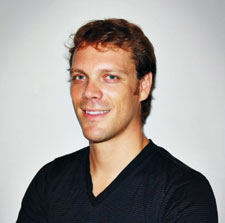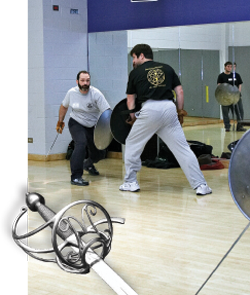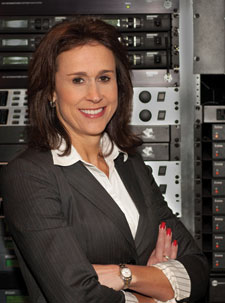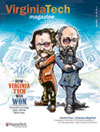 |
|
||||||
|
|
||||||||||||||||||||||||||||||||||||||||||||||||||||||||
|
Architecture alumnus plies his trade close to home by CHAD O'KANE M.A. '11
Now based in the firm's New York City offices, Colburn is applying his talents to a project close to his roots. He started working on the Center for the Arts at Virginia Tech toward the end of the design development phase and will continue through the project's completion, which is slated for mid-to-late 2013. "This provides an excellent opportunity to reconnect with Virginia Tech," he said. Colburn and his colleagues at Snøhetta envision the center, which will be the most modern building on campus, as a bridge between Blacksburg and Virginia Tech. "The site is situated at a prime location between the campus and downtown, giving it the ability to become a Blacksburg focal point and regional magnet," Colburn said. "We hope to enrich and blur the threshold between the campus and downtown and to collect a multitude of people in order to partake and interact in the arts." Colburn's love for construction and design dates back to his childhood in Colorado, where his family was involved in the industry. It was his time at Virginia Tech, however, that truly cultivated his passion for the craft. "The [architecture program] allows students the time, space, and freedom to explore, test, succeed, and fail," Colburn said. "We essentially learned to teach ourselves. This skill, coupled with motivation, can take you anywhere." Chad O'Kane (M.A. communication '11) was a graduate assistant with Virginia Tech Magazine.
Rogue Steel melds metalworking and theatre by OLIVIA KASIK
Massey makes about 20 to 30 weapons per week and usually has a backlog of two to three months. Like a blacksmith, Massey crafts all of his weapons by hand with the exception of some blades, which he purchases from commercial manufacturers. Rogue Steel, in Brookfield, Ill., offers mainly European-style weapons, but Massey plans to expand into Eastern-style as well. Eleven years since starting his business, Massey has established a strong reputation in the theatre community. Cara Rawlings, an assistant professor of movement and acting at Virginia Tech, considers Massey one of the best stage-weaponry makers in the world. Said Michael Hill-Kirkland, professor of theatre at Regent University and one of Rogue Steel's clients, "Neil has struck an impressive balance between sturdy utilitarianism and a stage-worthy, aesthetically pleasing look—and at an economical price." Massey's clients are primarily schools and universities with a stage combat aspect to their program, but individual theaters and actors also turn to Rogue Steel. Massey's weapons have even been used by actor John Malkovich. In addition to running a business, Massey teaches stage combat and fight choreography at Roosevelt University. He is a certified teacher with the Society of American Fight Directors, which he said helps him craft better swords. "I am one of the few swordmakers out there that actually uses them and teaches [people] how to use them on a regular basis," said Massey. Massey first came to Virginia Tech with aspirations to become a mechanical engineer. However, theatre quickly moved from a hobby to a passion. "The more I learned about it, the more I realized it was a viable career choice, so I made the switch," said Massey. "Being at Virginia Tech—learning about theatre and making connections—really laid out my career path." Olivia Kasik, a senior majoring in professional writing and psychology with a minor in philosophy, is an intern with Virginia Tech Magazine.
Hokie brings blogging, Twitter to government IT
Which is a large part of the reason—when combined with her gregariousness and pioneering expertise in using social media to make federal procurement more efficient—that Davie is now assistant commissioner for the GSA's Office of Integrated Technology Services (ITS), making her responsible for the largest fee-for-service IT procurement and services operation in the U.S. government. She was also recently named president of the American Council of Technology, a nonprofit, public-private partnership dedicated to improving government through information technology. Her ITS office provides access to companies that offer IT and telecommunications products, services, and solutions to government entities. "By using our contracts and programs, other government entities can not only save time and money by not having to create new contracts, but they also have access to technical and acquisition experts," Davie said. Two years ago, Davie joined others from the public and private sectors—including fellow Hokies Tom Suder (business management '91) and Tim Harvey (communication '92)—in forming the Better Buy Project to increase openness and reduce costs to the government and private sector. As a result, Davie has helped lead her department into the world of Twitter, blogs, and wikis. "I'm open and outgoing, and I saw this as an incredibly effective and potent way to be able to communicate broadly," said Davie, who praises Tech for the quality and variety of educational programs, student life, and the diversity of students. "Every time I meet someone and we discover we're both Hokies, there's an instant connection and bond," Davie said. "I've found this to be more true in the business world."
|
||||||||||||||||||||||||||||||||||||||||||||||||||||||||
|
|
||||||||||||||||||||||||||||||||||||||||||||||||||||||||




